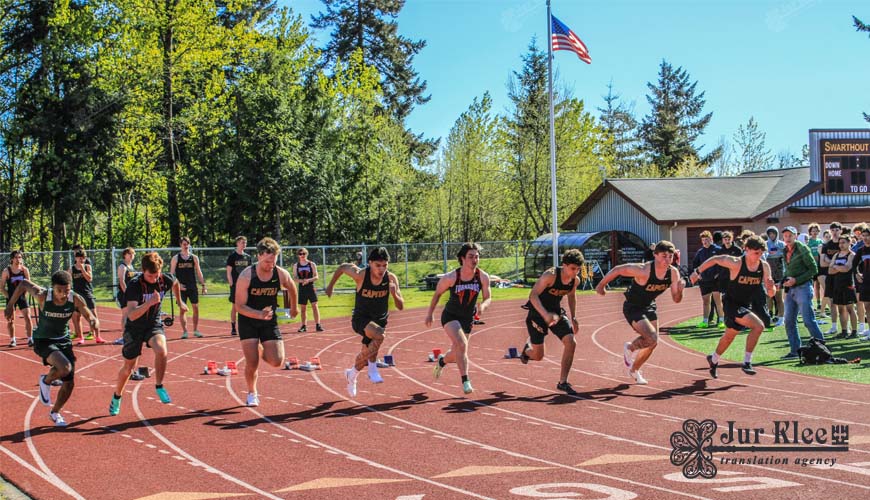
Translation of documents for international sports competitions: importance and key points
International sports competitions are not only an opportunity for athletes to demonstrate their skills and achievements, but also a complex organizational work that includes the preparation of many documents. To participate in such competitions, it is necessary to prepare a number of official documents, which must be translated into the language of the country in which the event is being held. Translation of documents for international sports competitions requires high accuracy and professionalism, as any mistake can lead to disqualification or other negative consequences.
In this article, we will explain why the translation of documents for international sporting events is so important, which documents usually require translation, and how to properly organize this process.
Translation of documents for international competitions is not just a formality, but an important aspect of preparing athletes and teams to participate in competitions. It ensures that the documents are understood and accepted by the organizers, judges and officials of the country in which the competition is being held.
The main reasons for the importance of translation:
- Legal and administrative accuracy. Documents such as athletes' licenses, medical certificates and approvals from sports federations must be translated correctly to eliminate misunderstandings and errors when they are checked by the organizers.
- Cultural and language barriers. Each country has its own requirements for the design and content of documents, and translations help to overcome language barriers by making documents accessible to all interested parties.
- Compliance with international standards. International sports competitions are subject to strict rules and standards that are regulated by various sports organizations such as the International Olympic Committee (IOC) or FIFA. Translations help to ensure compliance with these standards and the correct execution of all documents.
Which documents require translation?
Depending on the type of competition and its scale, different documents may be required for translation. The main types of documents that usually require translation to participate in international sports competitions are listed below:
Licenses and accreditations of athletes: In order to participate in international competitions, each athlete must have the appropriate licenses confirming his right to participate in competitions. These licenses are issued by sports federations, and for their recognition in the international arena they must be translated into the language of the host country.
Medical certificates: The health of athletes is a key aspect of any competition, and many international organizations require the provision of medical certificates confirming the health of participants and their readiness to participate. These documents must also be translated so that doctors and competition organizers can correctly assess the health status of athletes.
Insurance policies: Participation in major sporting events often requires an insurance policy that covers medical expenses and other risks. Insurance policies should be translated so that, if necessary, the organizers or medical staff can quickly navigate and take the right measures.
Contracts and agreements: If a competition requires the conclusion of any contracts (for example, with the organizers, sponsors or coaches), these documents also require accurate translation in order to comply with legal norms and protect the rights of all participants.
Documents of sports organizations: Often, when participating in competitions, documents from national or international sports federations are required, such as participation permits, accreditation confirmations or doping control results. These documents also need to be translated.
Key requirements for the translation of sports documents
The translation of documents for international sports competitions requires special attention to detail and compliance with certain standards.
Accuracy and legal correctness: The translation of sports documents should be as accurate as possible, especially when it comes to legal aspects such as licenses or agreements. Any mistake can lead to misunderstandings or even legal consequences. The translation must be performed by a professional who understands the specifics of sports terminology and legal norms.
Notarization and legalization: Many documents, especially those related to the health and legal capacity of athletes, require notarization of the translation. This confirms the authenticity of the document and its compliance with the original. In some cases, an apostille or legalization of translated documents may be required for their recognition in another country.
Use of specialized sports terminology: Sports has its own unique terminology, which must be translated correctly to avoid misunderstandings. This is especially important for documents such as competition rules, instructions, or protocols. The translator must be well versed in sports specifics in order to correctly convey all the nuances.
Timely translation: Given that the preparation for international competitions includes many stages, it is important to ensure the timely translation of all necessary documents. Delays may lead to athletes not being able to submit documents on time, which may negatively affect their participation in competitions.
Examples of successful translation for international competitions
To participate in the Olympic Games, athletes and their teams are required to provide a variety of documents, including accreditations, medical certificates and doping tests. All these documents must be translated into the official language of the host country and certified by the relevant authorities.
During the World Cup, teams and players also provide translated documents, including medical certificates and insurance policies, to ensure that all safety and health requirements are met.
Translation of documents for international sports competitions is an important process that requires a professional approach, accuracy and compliance with deadlines. Not only the participation of athletes depends on the correct translation, but also the success of the entire team in the international arena.
By seeking the help of JurKlee professional translators and following the recommendations for the organization of translation, you can ensure successful participation in any international sports event without unnecessary delays and problems.
